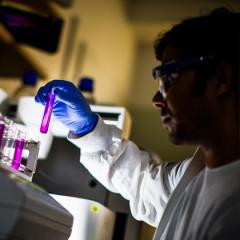Researchers from the University of Queensland (UQ) will play a key collaborative role in a national effort to revolutionise treatment options for patients with prostate cancer.
The project, led by radiopharmaceutical company AdvanCell, received $18 million in federal funding from the Medical Research Future Fund (MRFF) frontier initiative to develop and deliver new targeted therapies for the disease - which affects nearly 25,000 men in Australia each year.
As one of several partners, the Australian Institute for Bioengineering and Nanotechnology (AIBN), along with UQ Centre for Clinical Research (UQCCR), will contribute its world-leading expertise in preclinical PET imaging, diagnostic nanotechnology, and biomarker discovery to help advance AdvanCell’s promising new class of treatments, known as targeted alpha therapy.
This next-generation radiotherapy delivers highly potent alpha radiation directly to cancer cells, while minimising harm to healthy tissue - offering a potentially game-changing approach for the treatment of various cancers.
AdvanCell’s Chief Medical Officer, Dr. Anna Karmann, said the collaboration will help fast-track translation of their research and accelerate the development of promising targeted alpha therapy combinations.
Join The Network
Stay on top of our industry news and developments, events and opportunities, by joining The Network
Head of AdvanCell’s Translational Medicine and Clinical Science, Professor Stephen Rose said that the funding was an important step for Australian innovation to improve the lives of men with prostate cancer.
“This investment allows us to accelerate the translation of our Targeted Alpha Therapy - one of the most promising advances in cancer treatment.
“Our multidisciplinary multi-institutional approach is key to defeating prostate cancer.”
AIBN’s Deputy Director Professor Kristofer Thurecht said that as part of the project, AIBN researchers will contribute to key areas to inform how, when and where these new therapies are delivered to patients, and their impact on tissues in the body.
“Our role is to help develop strategies that show how radiation affects cancer cells and design new diagnostic tools that reveal how a patient's immune system is responding to treatment,” Professor Thurecht said.
“This will enable AdvanCell’s clinical team to identify the suitable patients for clinical trials, monitor how well the therapy is working, and adjust treatment strategies in real time as needed – ultimately making targeted alpha therapy more precise and effective.”
The AIBN investigator team - Dr Alain Wuethrich, Professor Kris Thurecht and Professor Matt Trau - will develop new imaging and nano-diagnostic technology that allow researchers to see how immune cells are reacting to tumours during treatment.
“By tracking how the immune system behaves during treatment, using our newly developed ImmunoStorm-chip technology, we can better predict whether a particular therapeutic strategy will be effective - or if it’s time to try another approach,” Dr Alain Wuethrich said.

AIBN affiliate and UQCCR lab head Dr. Kevin Koo is analysing patient samples in collaboration with AdvanCell to uncover why some prostate cancer patients respond better to treatment than others.
“Every patient and tumour is different, which is why we’re trying to understand why some respond exceptionally well to targeted alpha therapy,” Dr Koo said.
“This knowledge will help clinicians personalise therapies and improve outcomes.”
This exciting research program is eligible for extension funding beyond 2029, to bring next-generation prostate cancer treatments to the real-world.
Want to learn more about this story or how you can partner with AIBN on ground-breaking research?
Contact us via email: communications@aibn.uq.edu.au
or phone: +61 414 984 324


